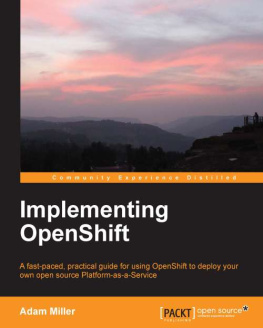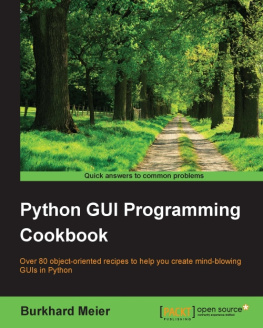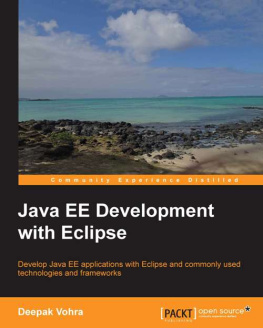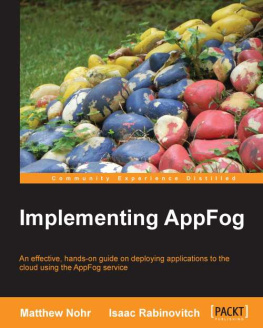Gulati S. - OpenShift Cookbook
Here you can read online Gulati S. - OpenShift Cookbook full text of the book (entire story) in english for free. Download pdf and epub, get meaning, cover and reviews about this ebook. genre: Computer. Description of the work, (preface) as well as reviews are available. Best literature library LitArk.com created for fans of good reading and offers a wide selection of genres:
Romance novel
Science fiction
Adventure
Detective
Science
History
Home and family
Prose
Art
Politics
Computer
Non-fiction
Religion
Business
Children
Humor
Choose a favorite category and find really read worthwhile books. Enjoy immersion in the world of imagination, feel the emotions of the characters or learn something new for yourself, make an fascinating discovery.
OpenShift Cookbook: summary, description and annotation
We offer to read an annotation, description, summary or preface (depends on what the author of the book "OpenShift Cookbook" wrote himself). If you haven't found the necessary information about the book — write in the comments, we will try to find it.
Over 100 different solutions and shortcuts that help you to develop and deploy your next application quickly and efficiently
A comprehensive guide containing recipes on a wide variety of topics to assist developers from all backgrounds, from horizontal scaling and periodic database back-up to application monitoring
Written in a clear and comprehensible style that offers support for Java, Python, and Node.js developers
OpenShift Cookbook — read online for free the complete book (whole text) full work
Below is the text of the book, divided by pages. System saving the place of the last page read, allows you to conveniently read the book "OpenShift Cookbook" online for free, without having to search again every time where you left off. Put a bookmark, and you can go to the page where you finished reading at any time.
Font size:
Interval:
Bookmark:
Copyright 2014 Packt Publishing
All rights reserved. No part of this book may be reproduced, stored in a retrieval system, or transmitted in any form or by any means, without the prior written permission of the publisher, except in the case of brief quotations embedded in critical articles or reviews.
Every effort has been made in the preparation of this book to ensure the accuracy of the information presented. However, the information contained in this book is sold without warranty, either express or implied. Neither the author, nor Packt Publishing, and its dealers and distributors will be held liable for any damages caused or alleged to be caused directly or indirectly by this book.
Packt Publishing has endeavored to provide trademark information about all of the companies and products mentioned in this book by the appropriate use of capitals. However, Packt Publishing cannot guarantee the accuracy of this information.
First published: October 2014
Production reference: 1221014
Published by Packt Publishing Ltd.
Livery Place
35 Livery Street
Birmingham B3 2PB, UK.
ISBN 978-1-78398-120-5
www.packtpub.com
Cover image by Gagandeep Sharma (<>)
Author
Shekhar Gulati
Reviewers
Troy Dawson
Andrea Mostosi
Rahul Sharma
Acquisition Editor
Richard Harvey
Content Development Editor
Neil Alexander
Technical Editors
Sebastian Rodrigues
Gaurav Thingalaya
Copy Editors
Sarang Chari
Deepa Nambiar
Adithi Shetty
Project Coordinator
Sageer Parkar
Proofreaders
Maria Gould
Lauren E. Harkins
Jonathan Todd
Indexer
Tejal Soni
Production Coordinators
Aparna Bhagat
Shantanu N. Zagade
Cover Work
Aparna Bhagat
Shekhar Gulati is a developer and OpenShift evangelist working with Red Hat. He has been evangelizing about OpenShift for the last 2 years. He regularly speaks at various conferences and user groups around the world to spread the goodness of OpenShift. He regularly blogs on the OpenShift official blog and has written more than 50 blogs on OpenShift. Shekhar has also written many technical articles for IBM developerWorks, Developer.com, and Javalobby.
Troy Dawson is most famous as one of the two original developers of Scientific Linux. His work on Scientific Linux first began during his 18 years at Fermilab. He started out at Fermilab running and operating the Tevatron accelerator, but has shifted to computers for the last 12 years. Troy not only worked as a system administrator, but also helped create the operating systems he administered. He was half of the team that built and maintained Fermi Linux. That same team later created Scientific Linux for labs and universities outside of Fermilab.
In 2011, Troy stepped out of the Scientific Linux spotlight and started working behind the scenes on the OpenShift project. He began work on OpenShift during the first year of its creation. Troy is currently on the OpenShift Online Operations team, but his packaging and debugging work spans the entire project.
Andrea Mostosi is a technology enthusiast. He has been an innovation lover since he was a child. He began his professional career in 2003 and worked on several projects, playing almost every role in the computer science environment. He is currently the CTO of The Fool, a company that tries to make sense of web and social data.
I would like to thank my geek friends: Simone M., Daniele V., Luca T., Luigi P., Michele N., Luca O., Luca B., Diego C., and Fabio B. They are the smartest people I know, and comparing myself to them has always pushed me to do better.
Rahul Sharma is a senior developer with Mettl. He has 9 years of experience in building and designing applications on Java/J2EE platforms. He loves to develop open source projects, and has contributed to a variety of them, such as HDT, Crunch, Provisionr, and so on. He often shares his knowledge at http://devlearnings.wordpress.com/.
You might want to visit www.PacktPub.com for support files and downloads related to your book.
Did you know that Packt offers eBook versions of every book published, with PDF and ePub files available? You can upgrade to the eBook version at > for more details.
At www.PacktPub.com, you can also read a collection of free technical articles, sign up for a range of free newsletters and receive exclusive discounts and offers on Packt books and eBooks.

http://PacktLib.PacktPub.com
Do you need instant solutions to your IT questions? PacktLib is Packt's online digital book library. Here, you can access, read and search across Packt's entire library of books.
- Fully searchable across every book published by Packt
- Copy and paste, print and bookmark content
- On demand and accessible via web browser
If you have an account with Packt at www.PacktPub.com, you can use this to access PacktLib today and view nine entirely free books. Simply use your login credentials for immediate access.
OpenShift is an open source, polyglot, and scalable Platform as a Service (PaaS) from Red Hat. At the time of writing this, OpenShift officially supports the Java, Ruby, Python, Node.js, PHP, and Perl programming language runtimes, along with the MySQL, PostgreSQL, and MongoDB databases. It also offers Jenkins CI, RockMongo, Mongo Monitoring Service agent, phpMyAdmin, and a lot of other features. OpenShift, being extensible in nature, allows developers to extend it by adding support for runtimes, databases, and other services, which OpenShift currently does not support. Developers can work with OpenShift using command-line tools, IDE integrations, or a web console. OpenShift manages application deployment using a popular version control system named Git. The OpenShift PaaS has made cloud-enabled web application development an easy process. It is straightforward to deploy existing or new applications on OpenShift. Many developers around the world are making use of the OpenShift capabilities to develop and deploy faster.
Getting started with OpenShift is easy, but as is the case with many of the tools we use to develop web applications, it can take time to appreciate all the capabilities of OpenShift. The OpenShift platform and its client tools are full of features you might never have known to wish for. Once you know about them, they can make you more productive and help in writing scalable web applications.
OpenShift Cookbook presents over 100 recipes written in a simple and easy-to-understand manner. It will walk you through a number of recipes, showcasing the OpenShift features and demonstrating how to deploy a particular technology or framework on it. You can quickly learn and start deploying applications on OpenShift immediately. The cookbook also covers topics such as horizontal scaling and application logging and monitoring. The recipes covered address the common, everyday problems required to effectively run applications on OpenShift. The reader is assumed to be familiar with the PaaS and cloud computing concepts. The book does not need to be read from cover to cover, which enables the reader to choose chapters and recipes that are of interest.
Font size:
Interval:
Bookmark:
Similar books «OpenShift Cookbook»
Look at similar books to OpenShift Cookbook. We have selected literature similar in name and meaning in the hope of providing readers with more options to find new, interesting, not yet read works.
Discussion, reviews of the book OpenShift Cookbook and just readers' own opinions. Leave your comments, write what you think about the work, its meaning or the main characters. Specify what exactly you liked and what you didn't like, and why you think so.

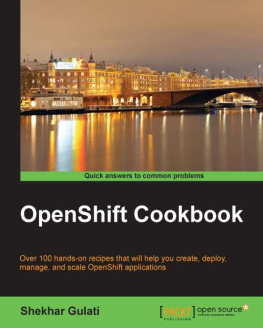
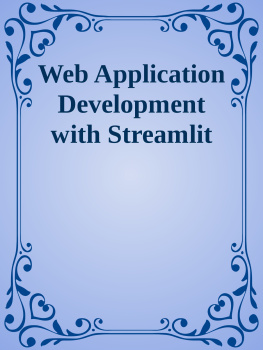
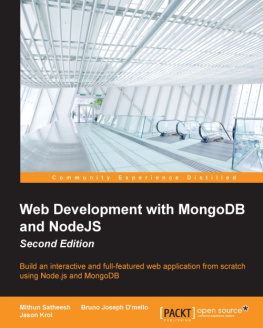
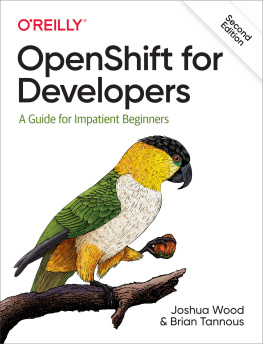

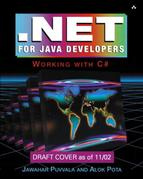
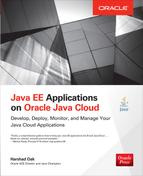
![Josh Juneau [Josh Juneau] - Java EE 8 Recipes: A Problem-Solution Approach](/uploads/posts/book/119371/thumbs/josh-juneau-josh-juneau-java-ee-8-recipes-a.jpg)
